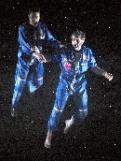Cosmonaut's Last Message To The Woman He Once Loved In The Former Soviet Union
Given a production with a title almost the length of a short story, I hope no one will be offended if, in the interests of brevity, I truncate the title to 'Cosmonaut's Last Message' in what follows.
That is not to imply that the title is inappropriate. In fact it's both intriguing and imaginative as well as being apt, because one main thread of the play concentrates on two cosmonauts forgotten about in the aftermath of the break-up of the Soviet Union, and thus stranded in space. Casimir (Sean Campion) wonders about his daughter and desperately tries to use the spacecraft's equipment to contact earth, and Oleg (Paul Higgins) wants to say something to a woman he once loved, but realises that communication is impossible because no-one is listening.
The scenes during the play alternate between the bickering cosmonauts floating helplessly in and outside their space capsule, and settings on earth where the rest of the seven-member cast play out interconnected vignettes in different character roles.
For example, we first meet Keith and Vivienne while they are trying to get reception from their troublesome TV set. Lost for something to do, Vivienne suggests they read, while Keith 'sweats like a pig' and tinkers with the TV or worries about going outside in case he bumps into some local yobs. It's pretty clear that this staid, middle-aged couple are not really talking to each other, but simply talking - language without communication. In the next scene, Keith goes to London to meet with his Russian mistress, Nastasja, whose cosmonaut father never returned from his voyage into space and whose linguistic frustration is aptly described in the repeated use of her unique expletive: 'fuckshit'. Meanwhile, speech therapist Vivienne is trying to get a stroke victim to talk - he wants to say something but can't remember - the will to communicate but without the necessary linguistic faculties.
So, 'Cosmonaut's Last Message' focuses on the inability of humans to communicate effectively with each other. In spite of the fact that most man-made communication aids - computer, phone, voice recorder- are liberally littered throughout the various scenes, the characters simply can't use language to communicate their feelings.
David Greig's carefully crafted play is sombre (some might even say depressing), but perfectly suited to the intimate venue - I'm not sure it would work nearly so well in an auditorium with a traditional proscenium arch. With most of the audience at arms length, the confident and able cast managed to keep the audience unsettled whilst retaining their attention throughout, even though only about a third of them laughed at the darker humour the play incorporates - a significant reaction I think.
There's some ingenious and inventive staging in Melly Still's design with the compact interior of the Donmar being divided vertically into 2 main areas: 'space' occupying the higher level and earth the lower one. And there's quite a surprise in store when we first meet the cosmonauts - I won't spoil the experience except to say that, in itself, it's almost a justification for seeing the play.
The hard-working and committed cast moved fluidly and convincingly between their various roles, and I particularly enjoyed Anna Madeley's performance as she effortlessly exchanged her Russian accent and lithe sexuality as Nastasja, for the down-to-earth and somewhat patronising Scottish policewoman, Claire.
It's hard not to leave 'Cosmonaut's Last Message' with a bleak view of the future, even though Greig presents us with an urgent and succinct direction in the final line - "Let's talk". As a pessimist, I'm not sure how much effect this will have on most of us. For in an age where we have more power and capability to communicate than ever before, we seem increasingly reluctant to use that very faculty which sets humans above the rest of the earth's occupants. Even so, 'Cosmonaut's Last Message' certainly has something important to say, and pulls no punches in saying it. Engrossing and well worth seeing.
(Peter Brown)
What other critics had to say.....
NICHOLAS DE JONGH for THE EVENING STANDARD says, "Intriguing." LYN GARDNER for THE GUARDIAN says, "This is one of those plays that you end up admiring more than liking...It may be an elusive evening, but it is never a dull one." CHRLES SPENCER for THE DAILY TELEGRAPH says, "Combining wit with heartfelt emotion." IAN JOHNS for THE TIMES says, "By the end the human tales have become so fragmented and drawn out that the whole thing becomes lost in space. We've got the message but it's hard to feel anyone's pain. As we all know, in space no one can hear you scream."
External links to full reviews from popular press
The Guardian
Daily Telegraph
The Times
Originally published on
